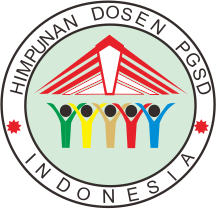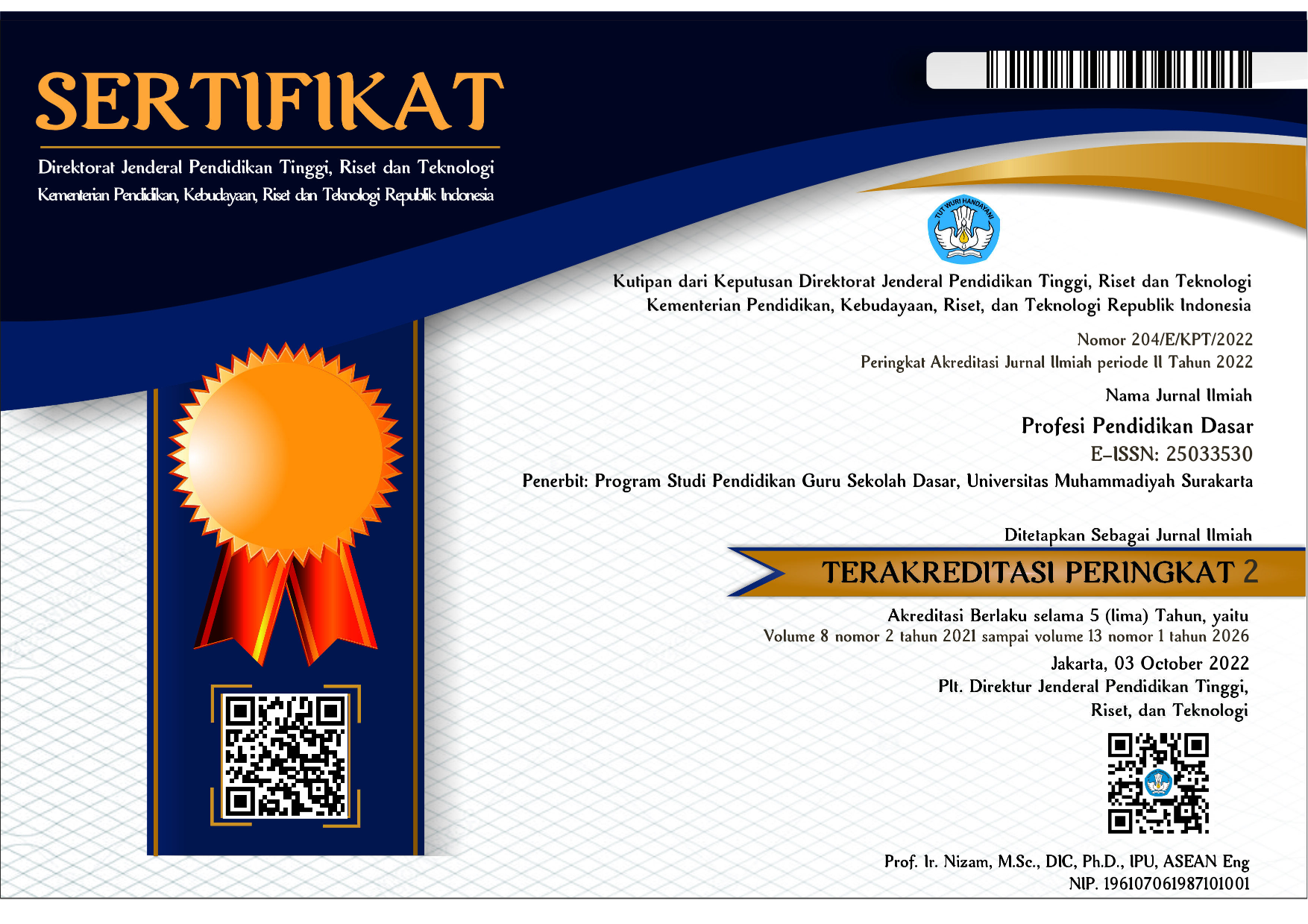Curriculum Management Strategies and Effective Implementation of Universal Basic Education in Nigeria
Nimota Jibola Kadir Abdullahi(1*)(1) University of Ilorin, Kwara State
(*) Corresponding Author
Abstract
Keywords
Full Text:
PDFReferences
Abdullahi, E. O. (2016). Principle of classroom evaluation. In A. A. Adegoke, R. A. Lawal, A. G. A. S. Oladosu & A. A. Jekayinfa (eds.). Introduction to teaching methodology. Haytee Press and Publishing Company Nigeria Ltd, Ilorin Kwara State, Nigeria.
Abdullahi, N. J. K. (2020). Human Resource Development And Management Of Tertiary Education For Global Competitiveness In Nigeria. Journal of Arts & Social Sciences (JASS), 75–88. https://doi.org/10.46662/jass-vol7-iss1-2020(75-88).
Abdullahi, N. J. K. (2020). Managing Teaching Approach In Early Childhood Care Education Towards Skill Development In Nigeria. Southeast Asia Early Childhood Journal, 9(1), 59–74. https://ojs.upsi.edu.my/index.php/SAECJ/article/view/3527.
Abdullahi, N. J. K. (2021). Managing functional basic education for job creation through emerging technologies and innovation in Nigeria. Journal of Business Studies, 42(1&2), 36-56.
Adesugba, A., & Temitope, T. (2019). curriculum development multi-cultural education in the Nigerian educational system. Journal of Scientific Research and Studies, 6(4), 46-53. http://www.modernrespub.org/jsrs/abstract/2019/July/Adesugba%20and%20Temitope.htm.
Agbor, C. A. (2019). Determinants of effective implementation of Universal Basic Education programme in Ikom education zone of Cross River State, Nigeria. Global Journal of Educational Research, 18, 9-13. https://doi.org/10.4314/gjedr.v18i1.2
Anaduaka, U. S., & Okafor, C. F. (2013). The Universal Basic Education (UBE) Programme in Nigeria: Problems and prospects. Journal of Research in National Development, 11(1), 152–157. https://doi.org/10.4314/jorind.v11i1
Bell, E., Bryman, A., & Harley, B. (2007). Business research methods (5th ed.) New York: Oxford University Press.
Benita, M., & Matos, L. (2021). Internalization of mastery goals: The differential effect of teachers’ autonomy support and control. Frontiers in Psychology, 11. https://www.frontiersin.org/articles/10.3389/fpsyg.2020.599303.
Christian, S. U., Isaac, I. A., Chenedu, I. O., & Ekwutosi, M. N. (2021). Appraisal of the implementation of the Universal Basic Education programme in Ogoja education zone: Implication for curriculum implementation. Journal of Critical Review, 8(2), 106-118.
Chris, I. A., & Isaac, J. K. (2013). An assessment of stakeholders perception of the implementation of Universal Basic Education in North-central political zone of Nigeria. Journal of Education and Practice, 4(3), 158-165.
Choy, L. T. (2014). The strengths and weaknesses of research methodology: Comparison and complimentary between qualitative and quantitative approaches. Journal of Humanities and Social Sciences, 19(4), 99-104.
Cohen, L., Mainion, L., & Morrison, K. (2000). Research methods in education (5th ed,). London: Routledge Falmer.
Creswell, J. W. (2015). A concise introduction to mixed methods research. Thousand Oaks, California: SAGE.
Creswell, J. W., & Creswell, J. D. (2017). Research design: Qualitative, quantitative and mixed methods approach, USA: Sage Publication.
Diamantopoulos, A., Sarstedt, M., Fuchs, C., Wilczynski, P., & Kaiser, S. (2012). Guidelines for choosing between multi-item and single-item scales for construct measurement: A predictive validity perspective. Journal of the Academy of Marketing Science, 40(3), 434–449. https://doi.org/10.1007/s11747-011-0300-3.
Dike, S. (2014). Opening remarks presented at the training, the trainers workshop on the use of the revised 9 years basic education curriculum held at Rock view Hotel, Abuja Nigeria, 5-9th August.
Dillman, D. A., Jolene, D., & Leah, M. C. (2014). Internet, phone, mail and mixed mode surveys: The Tailored design method (4th ed.). Hoboken, NJ: John Wiley.
Eze, K. O., Ugwua, C. S., & Okeke, C. I. O. (2020). Extent of the upper basic education french language curriculum content-delivery with technologies in Nigeria secondary schools. International Journal of Mechanical and Production Engineering Research and Development, 10(4), 311-318.
Furner, J. M., & Gonzalez-DeHass, A. (2011). How do students’ mastery and performance goals relate to math anxiety? Eurasia Journal of Mathematics, Science and Technology Education, 7(4), 227–242. https://doi.org/10.12973/ejmste/75209
Gay, L. R., Mills, G. E., & Airasian, P. (2009). Educational research: Competencies for analysis.
Hesse-Biber, S. & Leavy, P. (2011). The practice of qualitative research. Thousand Oak, CA.
Idehen, C. O., & Izevbigie, T. I. (2000). Implementation of Universal Basic Education programme: The way forward. In J. A. Aghenta and D. Awanbor (Eds). The Nigerian Academy of Education. Benin City: Ambik Press Ltd.
Igbokwe, C. O. (2015). Curriculum reforms at the basic education level in Nigeria aimed at catching them young to create change. American Journal of Education Research, 3(1), 31-37.
Ikoya, P. O., & Onoyase, D. (2008). Universal Basic Education In Nigeria: Availability Of Schools’ Infrastructure For Effective Program Implementation. Educational Studies, 34(1), 11–24. https://doi.org/10.1080/03055690701785228
Karani, N. N. (2018). Self-efficacy evaluation survey on Chinese employee: Case of electronics Limited company “X1” (Shenzhen) and investment company Limited “X2” (Beijing). International Journal of E-Education, E-Business, E-management and E-learning, 8(1), 51-57.
Kyayemagye, F., & Kintu, D. (2020). Head teachers’ administrative skills and curriculum management in universal secondary education schools in kiruhura district, uganda. Teacher Education and Curriculum Studies, 5(3), 81. https://doi.org/10.11648/j.tecs.20200503.16
Mayer, A. (2013). Introduction to statistics and SPSS in psychology (1st ed.) England: Pearson Education Limited.
Miller, V. D., Poole, M. S., Seibold, D. R., Myers, K. K., Hee Sun Park, Monge, P., Fulk, J., Frank, L. B., Margolin, D. B., Schultz, C. M., Cuihua Shen, Weber, M., Lee, S., & Shumate, M. (2011). Advancing research in organizational communication through quantitative methodology. Management Communication Quarterly, 25(1), 4–58. https://doi.org/10.1177/0893318910390193.
Mkpa, M. A. (2005). Challenges of implementing the school curriculum in Nigeria. Journal of Curriculum Studies, 12(1), 9-17.
Mugenda, A., & Mugenda, O. (2013). Research methods: Qualitative and quantitative approaches. Nairobi: ACTS Press.
Murdaningsih, S., & Murtiyasa, B. (2016). An Analysis on Eight Grade Mathematics Textbook Of New Indonesian Curriculum (K-13) Based On PISA’s Framework. JRAMathEdu (Journal of Research and Advances in Mathematics Education), 1(1), 14–27. https://doi.org/10.23917/jramathedu.v1i1.1780
Neuman, W. L. (2013). Social research methods: Qualitative and quantitative approaches. USA: Pearson Education.
Nolan, J. (2016). growing mastery in New York curriculum. PhiDelta Kappan, 98(3), 41-48.
Okunola, J. L., Ocheho, T., & Akinselure, O. P. (2017). management of accounting curriculum and contemporary business environment: A study of selected tertiary institution in Nigeria. International Journal of Economics, Commerce, and Management, 5(7), 421-429.
Omosidi, A. S., Oyeniran, S. & Murtala, A. T.(2017). Assessment of school development planning on the implementation of Universal Basic Education programme in Kwara State, Nigeria. Kiu Journal of Social Humanities, 2(1), 61-69.
Patton, M. Q. (2002). Qualitative research and evaluation methods. 3rd Sage Publications: Thousand Oaks, CA.
Research Advisor. (2006). Sample size table. http://www.reseach-advisor.com.
Saurayi, I. D. (2020). Monitoring, evaluation and certification of the Universal Basic Education programme. In J. A. Aghenta and D. Awanbor (Eds). The Nigerian Academic of Education. Benin city: Ambik Press Ltd.
Uga, M. O., & Fanan, A. G. (2019). Management and administration of Universal Basic Education in Nigeria: Challenges, prospects and suggestions. BSUJEM, 1(2), 116-123.
Wali, U., Mati, U., Rahim, K., Zahid, U., & Abdulshahab, K. (2019). Impact of curriculum management heads on public and private secondary school performance in Khyber Pakhtunkhwa. Science International Journal, 31(3), 431-434.
Yilmaz, K. (2013). Comparison of quantitative and qualitative research traditions: Epistemological, theoretical, and methodological differences: european journal of education. European Journal of Education, 48(2), 311–325. https://doi.org/10.1111/ejed.12014.
Yeung, A. S., Craven, R. G., & Kaur, G. (2014). Influences of mastery goal and perceived competence on educational outcomes. Australian Journal of Educational & Developmental Psychology, 14, 117–130. https://eric.ed.gov/?id=EJ1041683
Article Metrics
Abstract view(s): 710 time(s)PDF: 356 time(s)
Refbacks
- There are currently no refbacks.


















